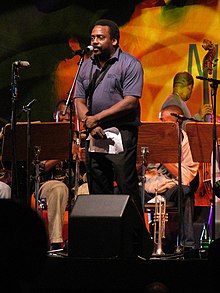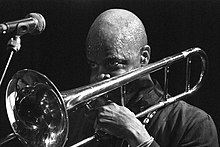David Murray Big Band Conducted by Lawrence "Butch" Morris
| David Murray Big Band Conducted by Lawrence "Butch" Morris | ||||
|---|---|---|---|---|
| Studio album by David Murray | ||||
|
Publication |
1991 |
|||
| Label (s) | DIW Records | |||
|
Format (s) |
CD |
|||
|
Title (number) |
8th |
|||
|
running time |
71:20 |
|||
| occupation |
|
|||
|
David Murray and Kazunori Sugiyama |
||||
|
Studio (s) |
Clinton Recording New York City |
|||
|
||||

David Murray Big Band Conducted by Lawrence "Butch" Morris is a jazz album by the David Murray Big Band, which was directed by Butch Morris . The recordings, which were made in two sessions on March 5 and 6, 1991 in New York City , were released in the same year on the Japanese jazz label DIW Records .
The album
In the course of his career, tenor saxophonist and bass clarinetist David Murray has worked alongside his regular bands with big band projects, as he did before in his sessions in New York's Sweet Basil in 1984 with Lawrence “Butch” Morris as conductor. His collaboration with Morris dates back to the early 1970s; In 1975 the joint quintet album Interboogieology was created with Johnny Dyani .
For their renewed collaboration, Murray and Morris arranged the material, which was mostly written by Murray, and put together an 18-piece big band, which included Hugh Ragin , Graham Haynes , Rasul Siddik , James Zollar , Craig Harris , Frank Lacy , Bob Stewart , Vincent Chancey , James Spaulding , Don Byron , John Purcell, and Fred Hopkins included.
The beginning of Murray's new big band production with Morris is the trilogy Paul Gonsalves , Lester and Ben , Murray's reminiscence of the three great swing tenorists Paul Gonsalves , Lester Young and Ben Webster . The Gonsalves Tribute is a recreation of the solo the saxophonist played in the legendary Duke Ellington Orchestra performance at the Newport Jazz Festival in 1956. After being transcribed by Andrew White, Murray orchestrated the 27 extended choruses of Gonsalves. He was initially influenced by Ellington's arrangement of "Diminuendo and Crescendo in Blue", but then found his own solution. The guest soloist, alongside Murray, is the pipe virtuoso Joel A. Brandon, the master whistler . The atmospheric composition "Lester" shows Murray as an accomplished ballad player without, however, really reflecting the style of Lester Young; Dave Murray's ballad play is more influenced by his contemporary Ben Webster. The last part of the trilogy, the homage to Ben Webster ("Ben") brings back his spirit all the more.
The second part of the album is more towards the musical present (New York); Murray wrote in the liner notes about the problem of producing a big band album in the musical atmosphere of New York in the early 90s; it is similar to “playing with acoustic instruments at a rap concert.” Calling Steve McCall , which Murray and Morris composed together, is dedicated to the memory of the drummer and colleague Steve McCall , who died two years earlier ; David Henderson contributed the text, which is performed by G'ra: The poem begins with the words Intense / A gentle thunder / He performed his Life / The drummer / My dear driend Steve McCall .
Craig Harris contributed the catchy, swinging composition "Love Joy" and can be heard there as the main soloist; Brian Olewnick called the “grandiose piece” a jazz standard in the trombonist's work. Harris also wrote the rap lyrics for the final track "Let the Music Take You".
Murray switched to the bass clarinet for the subsequent, memorably “ghostly” (Yanow) and mostly collective improvisation composition “Istanbul”.
In contrast, “David's Tune” is more conventional. "Let the Music Take You" was already the title track of a live album from 1978. Conceptually, this title stands out because of an arrangement with strong soul borrowings and the vocals of Andy Bey , who seeks borrowings from current trends such as rap, Bey begins with "Go with the flow of tenors / vibrating in the night blue sky / Let the music take you / to realms where minds can fly" and ends with the refrain : "Let the music take Ya, I'll shake Ya".
Rating of the album
In his review of the album at Allmusic , where he awarded the album the second highest rating, Scott Yanow initially said that Murray's big band, at times, “can be undisciplined and even out of control, but is never boring. This generally brilliant performance really has a few highlights ”, such as“ Paul Gonsalves ”,“ Ben ”, the colored“ David's Tune ”and“ Istanbul ”.
The authors Richard Cook and Brian Morton are more cautious in their ratings (they only gave the album three stars) and while they emphasized the complex arrangements of the Gonalves, Pres and Webster tributes, they found the execution on the album sometimes disappointingly banal; they lack the layered weirdness that one would otherwise expect from Butch Morris. The band was put together impressively; but it was a shame to have them all together and to hear them fired instead of giving them the opportunity to hear them play in sequence.
The title of the album
- David Murray Big Band Conducted by Lawrence "Butch" Morris (DIW-851, 1991)
- Paul Gonsalves (Gonsalves / Murray) - 17:37
- Lester - 9:56
- Ben - 10:09
- Calling Steve McCall (Murray / Morris) - 6:17
- Lovejoy (Craig Harris) - 6:11
- Istanbul - 9:24
- David's Tune - 7:50
- Let The Music Take You (Murray; lyrics by David Henderson and C. Harris) - 3:49
- All other compositions are by David Murray
literature
- Richard Cook , Brian Morton : The Penguin Guide to Jazz on CD . 6th edition. Penguin, London 2002, ISBN 0-14-051521-6 .
Web links
- David Murray Big Band Conducted by Lawrence "Butch" Morris on Allmusic (English)
- Kevin Whitehead : A User's Guide to David Murray on DIW: 1986-1997
- Blackout in the Square Root of Soul on Allmusic (English)
Remarks
- ↑ David Murray recorded a total of 26 albums for DIW between 1986 and 1997 , from duo to big band productions. When asked in a Down Beat about the reasons for this immense output, he gave some answers such as wanting to live well and having to pay alimony for two women. But he also said: I can document my whole program. People know what I'm doing, they know the different sides of me. Quoted from Kevin Whitehead.
- ↑ Scott Yanow, all music.
- ↑ See Kevin Whitehead
- ↑ Murray had already recorded the two compositions in 1987 in octets on the album Hope / Scope .
- ↑ Murray in the original: "Recording a big band album is like showing up or a rap concert with acoustic musicians instead of record DJ's."
- ↑ See Olewnick in Allmusic on the version that Craig Harris recorded on his own 1987 album Blackout in the Square - Root and Soul .
- ↑ published on the label Marge .
- ↑ See Cook / Morton and Yanow.
- ↑ See Cook / Morton, 6th edition, S1090.


